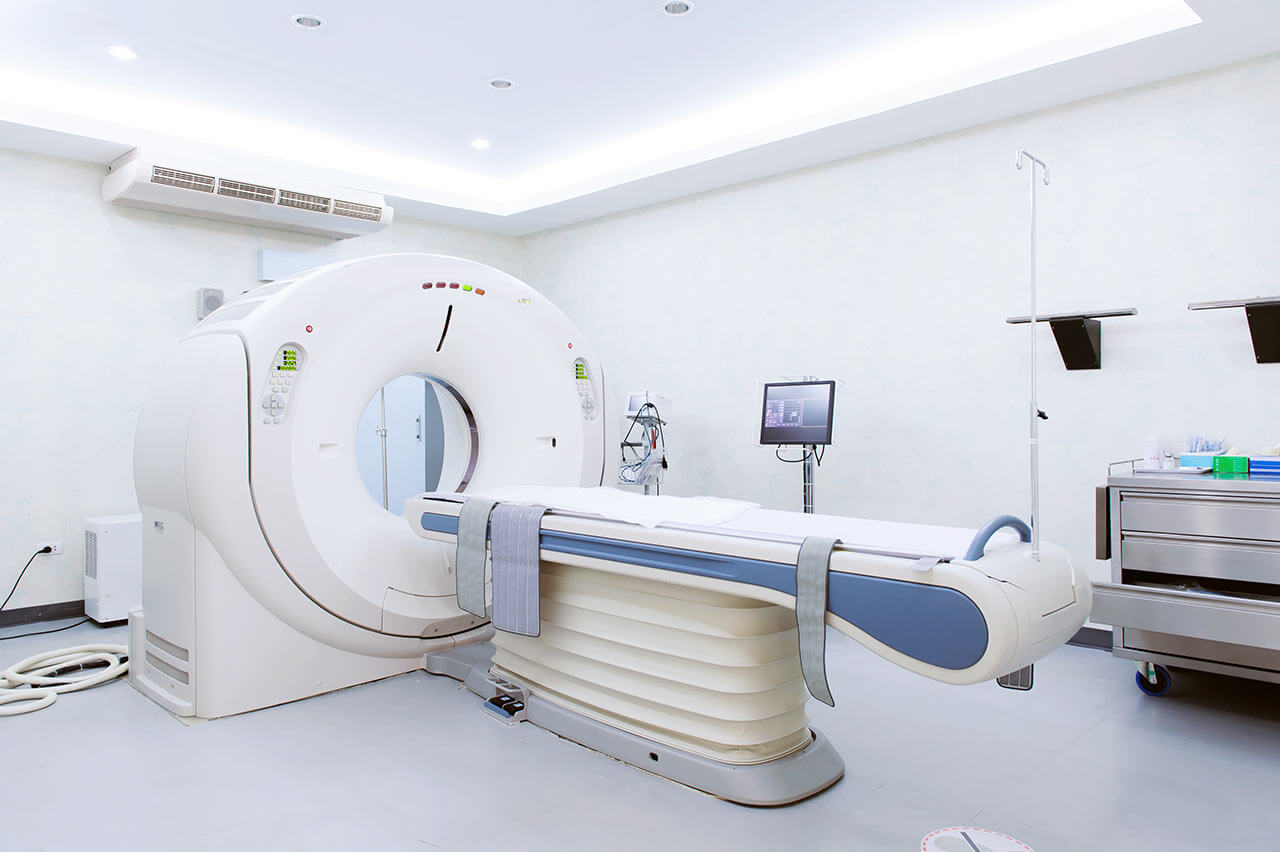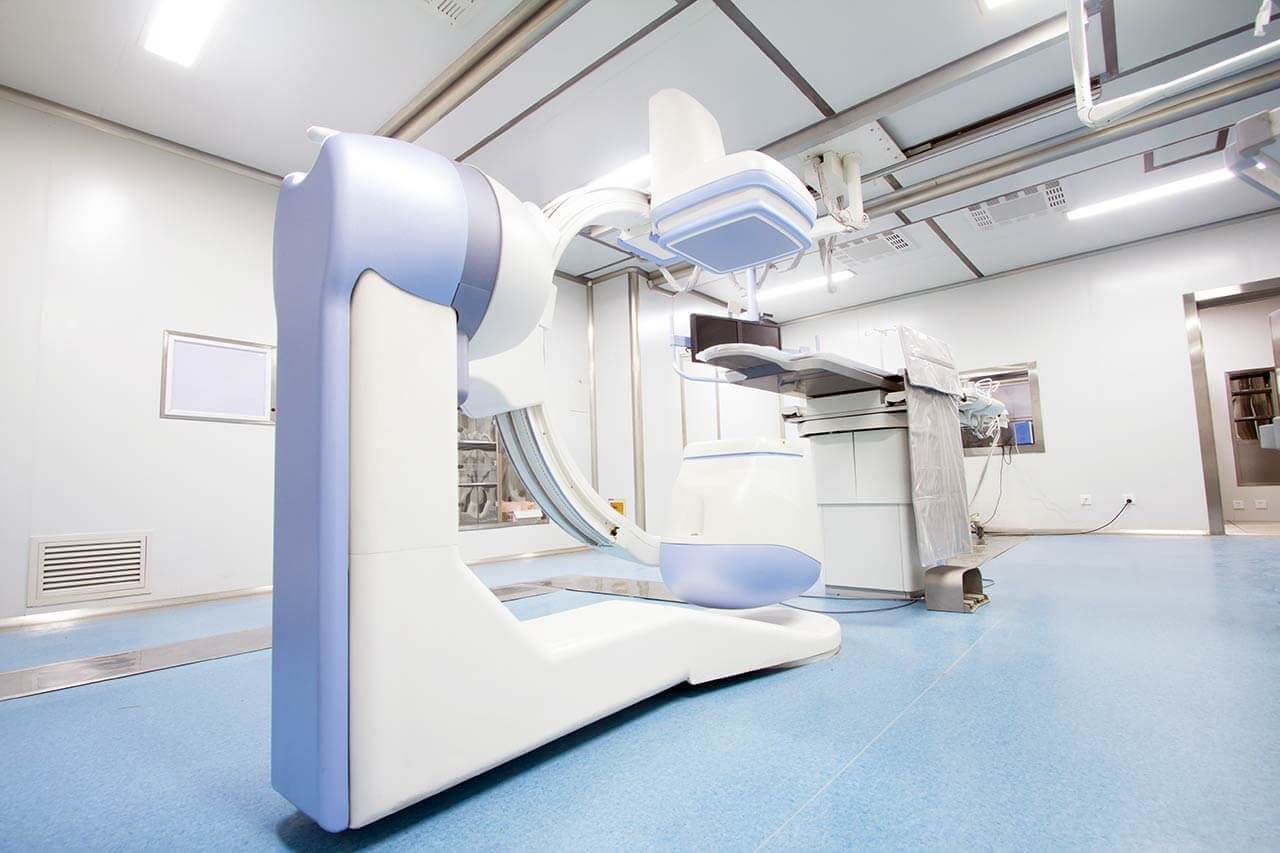
About the Department of Radiation Therapy at Charite University Hospital Berlin
According to the Focus magazine, the Department of Radiation Therapy at the Charite University Hospital Berlin is ranked among the best medical facilities in Germany in its area of specialization!
The department performs all types of modern radiation therapy for the treatment of benign and malignant tumors: intensity-modulated radiation therapy, volumetric-modulated arc therapy, stereotactic radiation therapy, image-guided radiation therapy, brachytherapy, and other types of radiation. The medical facility has the latest equipment – 8 powerful linear accelerators, 2 brachytherapy units, X-ray systems, devices for intraoperative radiation therapy and proton therapy, and advanced systems for individual radiation planning. The department offers the innovative CyberKnife radiosurgical system, which provides high-precision treatment of tumors of various locations. It should be noted that there are only 11 CyberKnife Treatment Centers in Germany, and the center of the Department of Radiation Therapy at the Charite Hospital is recognized as the best among them. The department is also one of the pioneers in Germany in the field of adaptive radiation therapy. In most cases, patients receive treatment on an outpatient basis, without hospitalization. Because of the importance of comprehensive medical care, the radiation therapists work hand in hand with specialists from the Charite Comprehensive Cancer Treatment Center, the National Center for Cancer Diseases Berlin (NCT), and the German Cancer Consortium (DKTK). The Head Physician of the department is Prof. Dr. med. Daniel Zips.
In the clinical practice of the department, the advanced CyberKnife radiosurgery system, which is available only in the leading medical centers of the world, is successfully used. The main advantage of CyberKnife therapy is that the device allows focusing high doses of radiation with millimeter precision. This guarantees effective destruction of cancer cells, while neighboring healthy tissues are not damaged. The technical features of the CyberKnife system allow it to target small and large tumors of almost any location, including tumors of the brain, head and neck, spine, chest, lungs, liver, pancreas, kidneys, and prostate, making it a unique tool in the fight against cancer. As a rule, one radiation session is enough for the patient – in rare cases, the radiation dose is divided into 3-5 procedures. Radiation with the CyberKnife system is carried out on an outpatient basis, so the patient can return to their usual lifestyle in the shortest possible time. In addition, the therapeutic procedure is absolutely painless and safe, therefore it is an excellent alternative to open surgery and traditional fractionated radiation therapy.
The department also offers stereotactic radiation therapy – a high-precision radiation method that involves targeted exposure of the tumor to very large doses of ionizing radiation with optimal protection of nearby normal tissues. Stereotactic radiation therapy is performed in the medical facility on a modern TrueBeam STx linear accelerator manufactured by Varian and using the CyberKnife system manufactured by Accuray. This type of radiation therapy is an effective method for treating brain metastases, acoustic neuroma, meningiomas, glomus tumors, craniopharyngiomas, and recurrent malignant gliomas. The equipment for stereotaxy allows for the irradiation of tumors up to 10 cm in size. A special mask is used for positioning and immobilizing the patient during the radiation procedure. The key advantages of stereotactic radiation therapy are its high precision and minimal side effects.
The Department of Radiation Therapy at the Charite University Hospital Berlin became one of the first in Germany where patients can undergo innovative adaptive radiation therapy. Such radiation is performed using a special Ethos linear accelerator manufactured by Varian, which was put into operation in October 2023. Adaptive radiation therapy is an innovative treatment method that takes into account the individual characteristics of the patient: before each radiation session, specialists from the department analyze in detail changes in the tumor, its position relative to surrounding tissues and organs. This makes it possible to direct ionizing radiation to the target area as accurately as possible without damaging healthy tissues. The Ethos system has a built-in modern high-precision imaging system and artificial intelligence technologies, which makes it unique among existing linear accelerators. The method is especially effective in the treatment of prostate cancer, bladder cancer, rectal cancer, and anal canal cancer.
The medical team of the department also applies modern radiation methods, such as image-guided radiation therapy (IGRT), intensity-modulated radiation therapy (IMRT), volumetric-modulated arc therapy (VMAT), intraoperative radiation therapy, brachytherapy, and others. All methods of radiation therapy are highly effective, allowing the radiation dose to be focused as accurately as possible on the pathological focus without damaging healthy tissues. During treatment, the department's doctors strictly adhere to current clinical protocols and radiation protection standards, which minimizes complications and risks for the patient.
The range of medical services provided by the department includes:
- CyberKnife radiation
- Brain diseases
- Brain metastases
- Acoustic neuroma
- Meningioma
- Arteriovenous malformations
- Trigeminal neuralgia
- Pituitary adenoma
- Spine and spinal cord diseases
- Spine metastases
- Meningiomas
- Neuromas
- Lung diseases
- Lung cancer (early stages)
- Lung metastases
- Prostate diseases
- Localized prostate cancer
- Localized recurrence of prostate cancer
- Single prostate cancer metastases to lymph nodes and bones
- Kidney and adrenal diseases
- Kidney and adrenal metastases
- Selected patients with renal cell carcinoma
- Liver diseases
- Liver metastases
- Individual cases of hepatocellular carcinoma
- Pancreatic diseases
- Selected patients with pancreatic cancer
- Head and neck tumors
- Skull base tumors
- Recurrent ENT tumors
- Brain diseases
- Stereotactic radiation therapy
- Brain metastases
- Acoustic neuroma
- Meningiomas
- Glomus tumors
- Craniopharyngiomas
- Recurrent malignant gliomas
- Adaptive radiation therapy
- Prostate cancer
- Bladder cancer
- Rectal cancer
- Anal canal cancer
- Brachytherapy
- Cervical cancer
- Endometrial cancer
- Intraoperative radiation therapy
- Image-guided radiation therapy (IGRT)
- Intensity-modulated radiation therapy (IMRT)
- Volumetric-modulated arc therapy (VMAT)
- Visual-guided radiation therapy
- Total body irradiation (before bone marrow transplantation)
- Total skin irradiation for the treatment of cutaneous T-cell lymphoma
- Proton therapy
- Choroidal melanoma
- Ciliary body melanoma
- Iris melanoma
- Conjunctival melanoma
- Eye hemangioma
- Retinoblastoma
- X-ray therapy
- Arthrosis
- Heel spur
- Tennis elbow
- Cancer treatment methods that are performed in combination with radiation therapy
- Chemotherapy
- Hyperthermia
- Palliative care
- Other medical services






